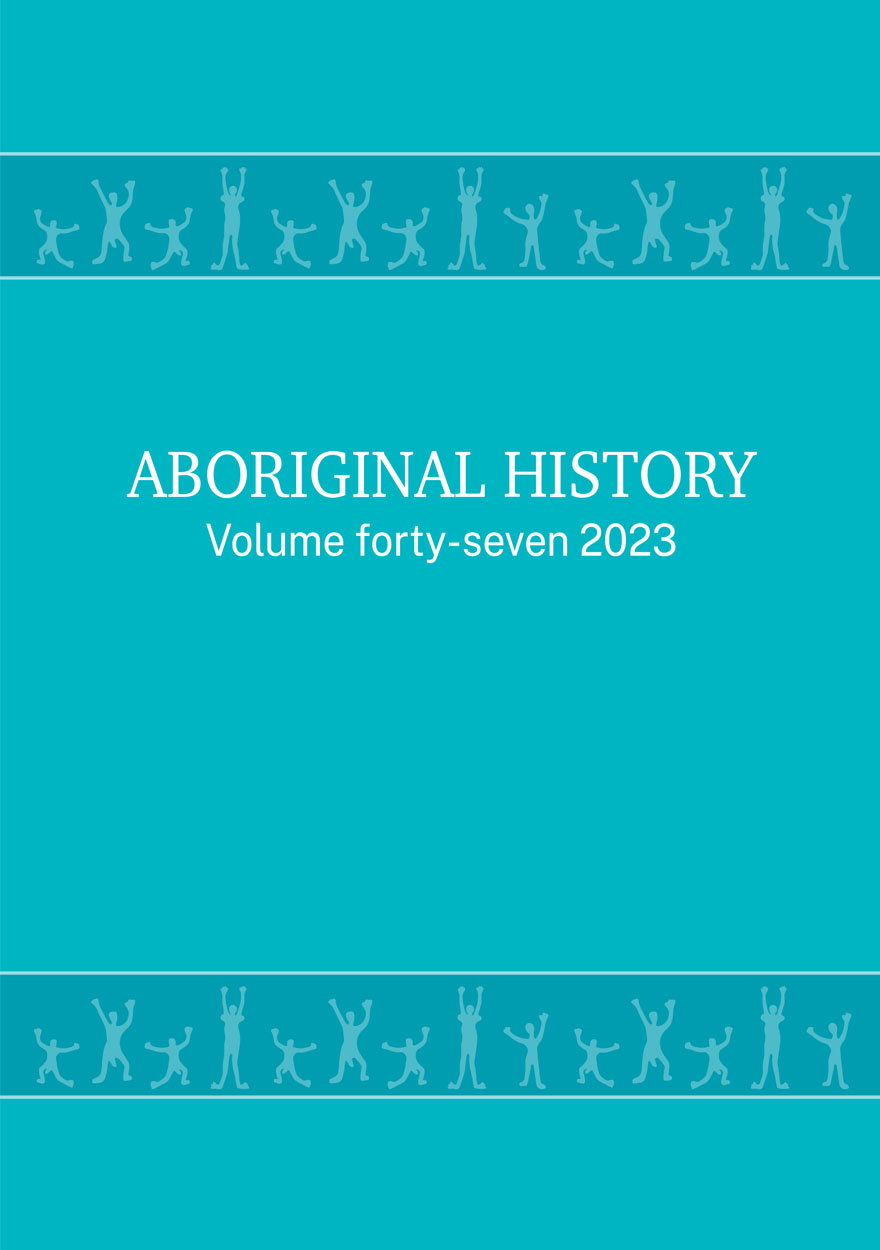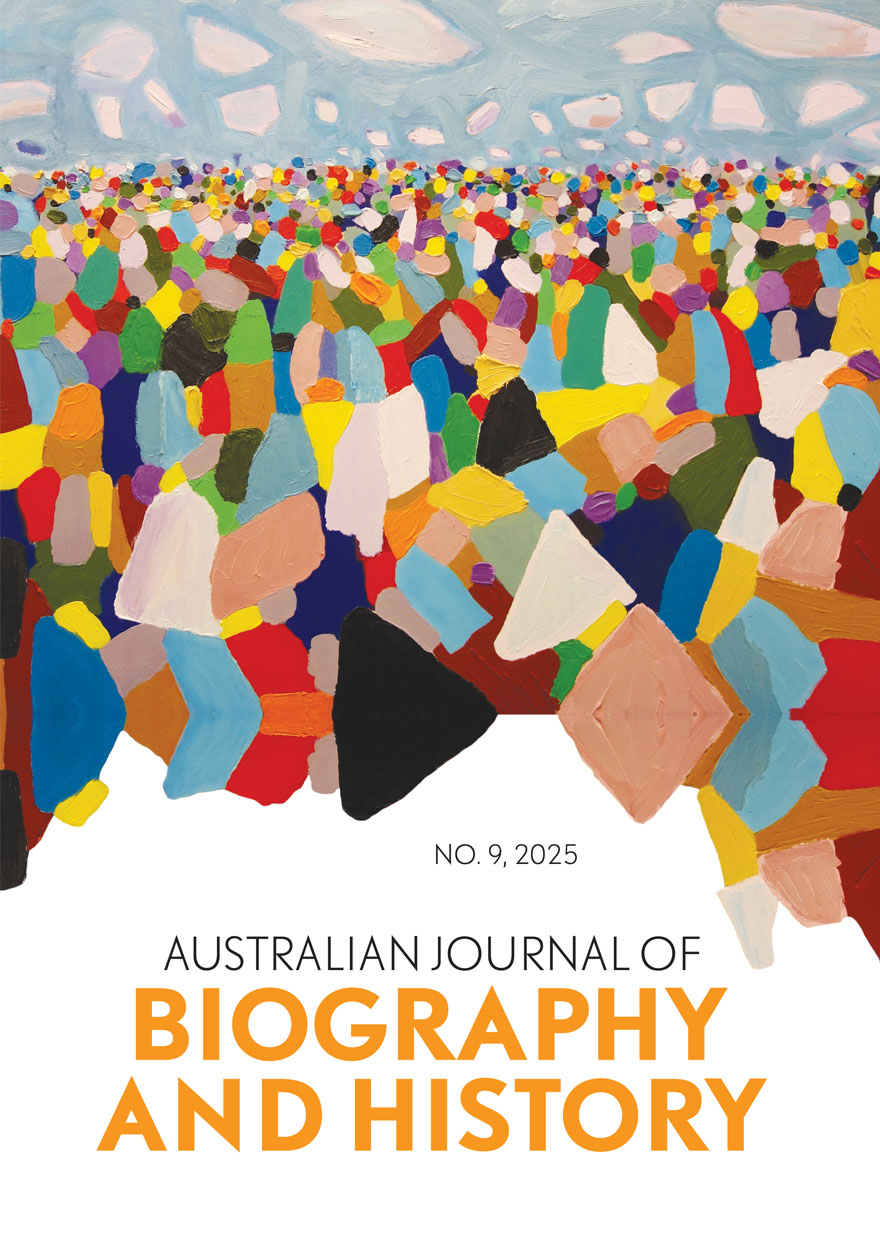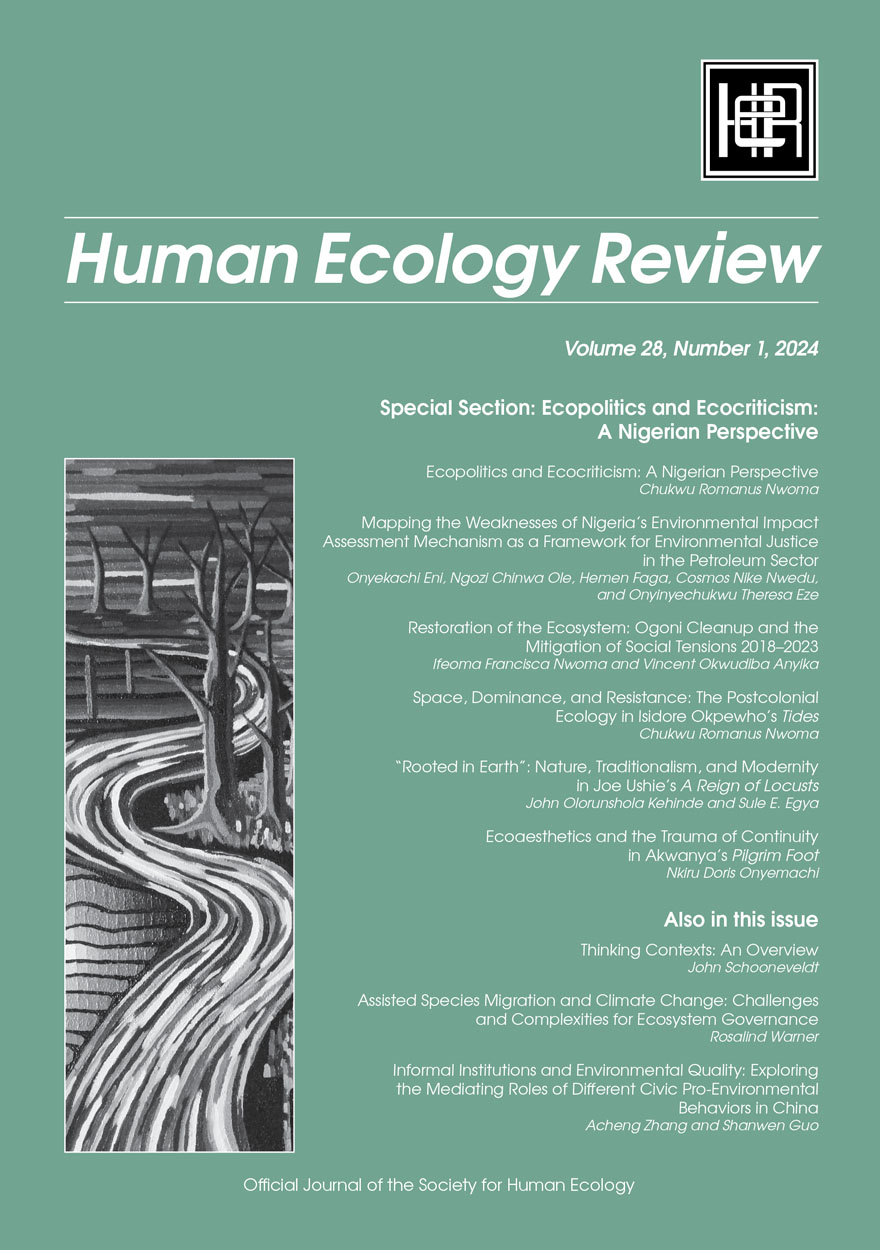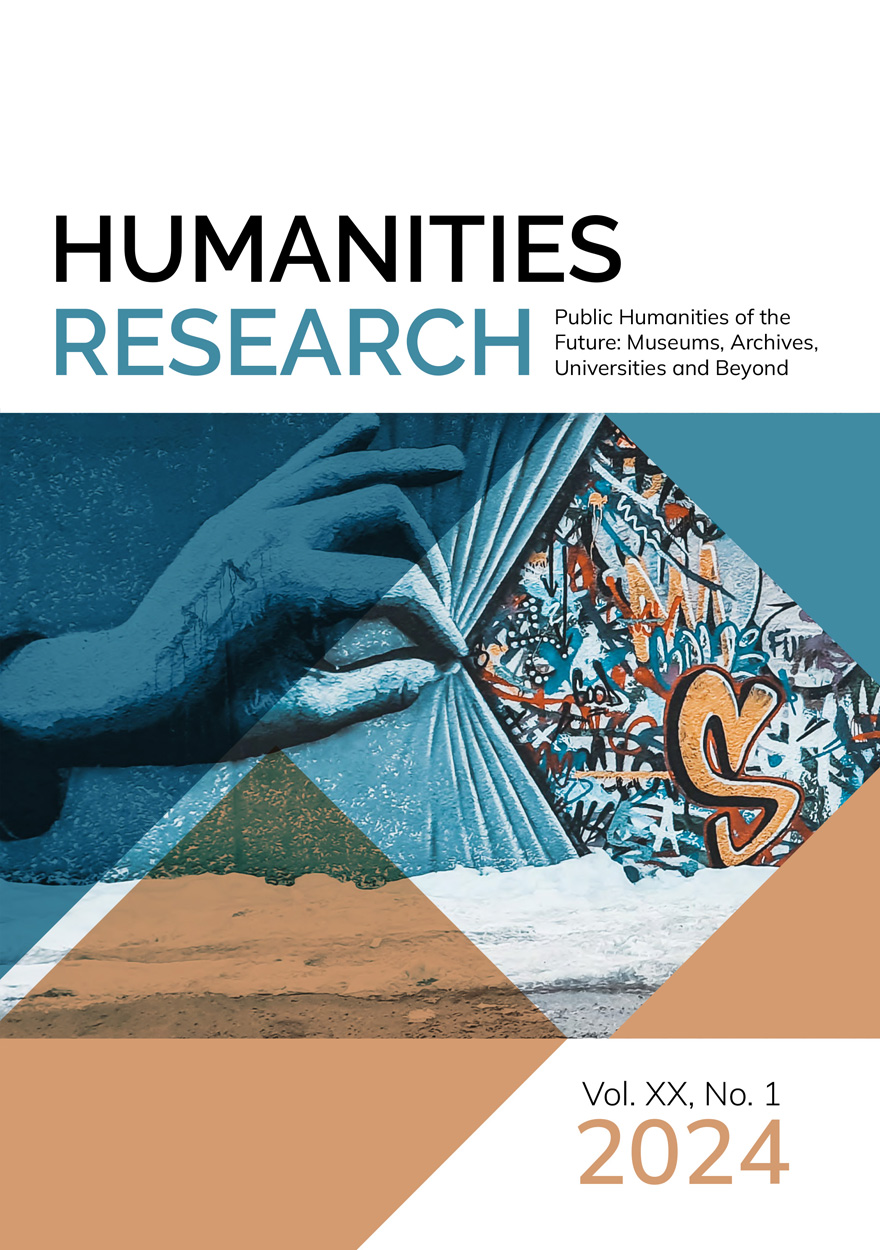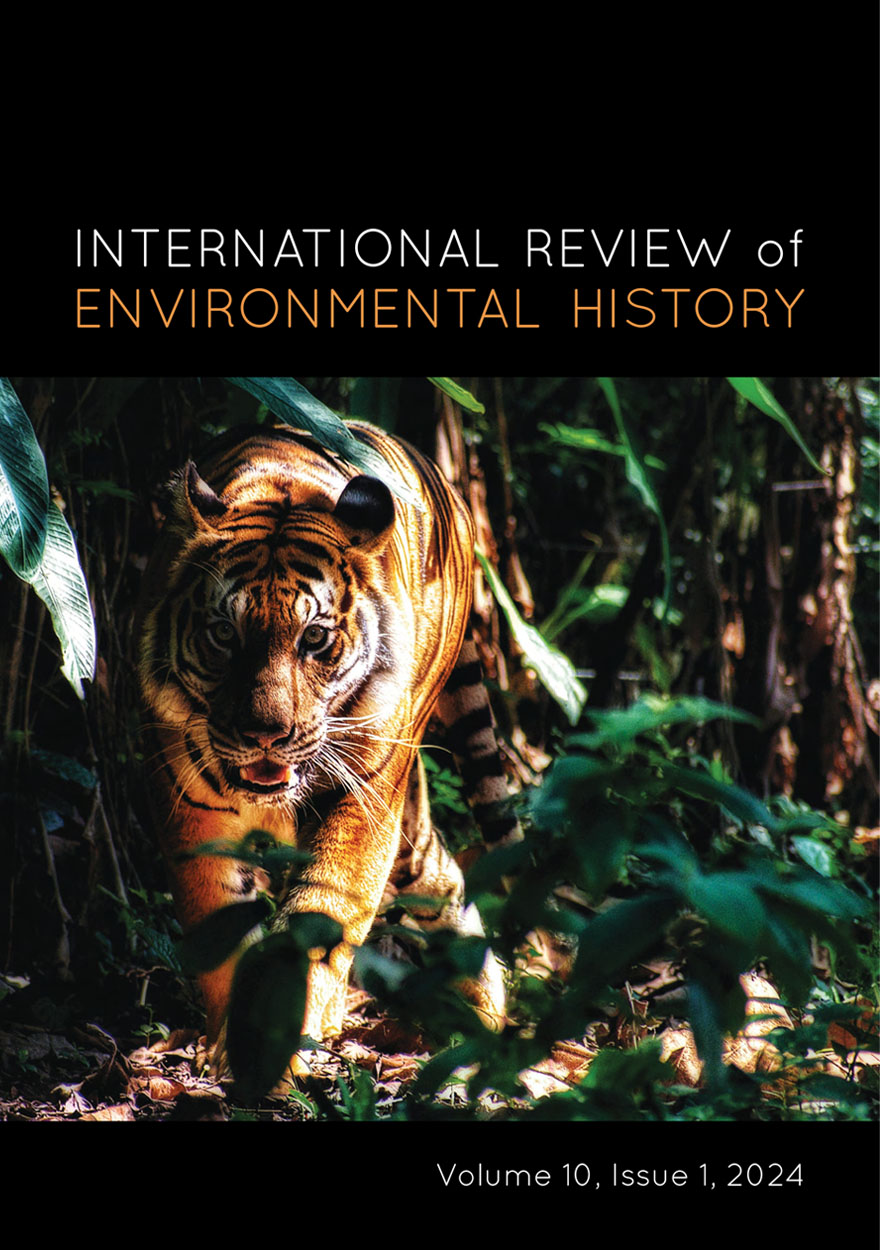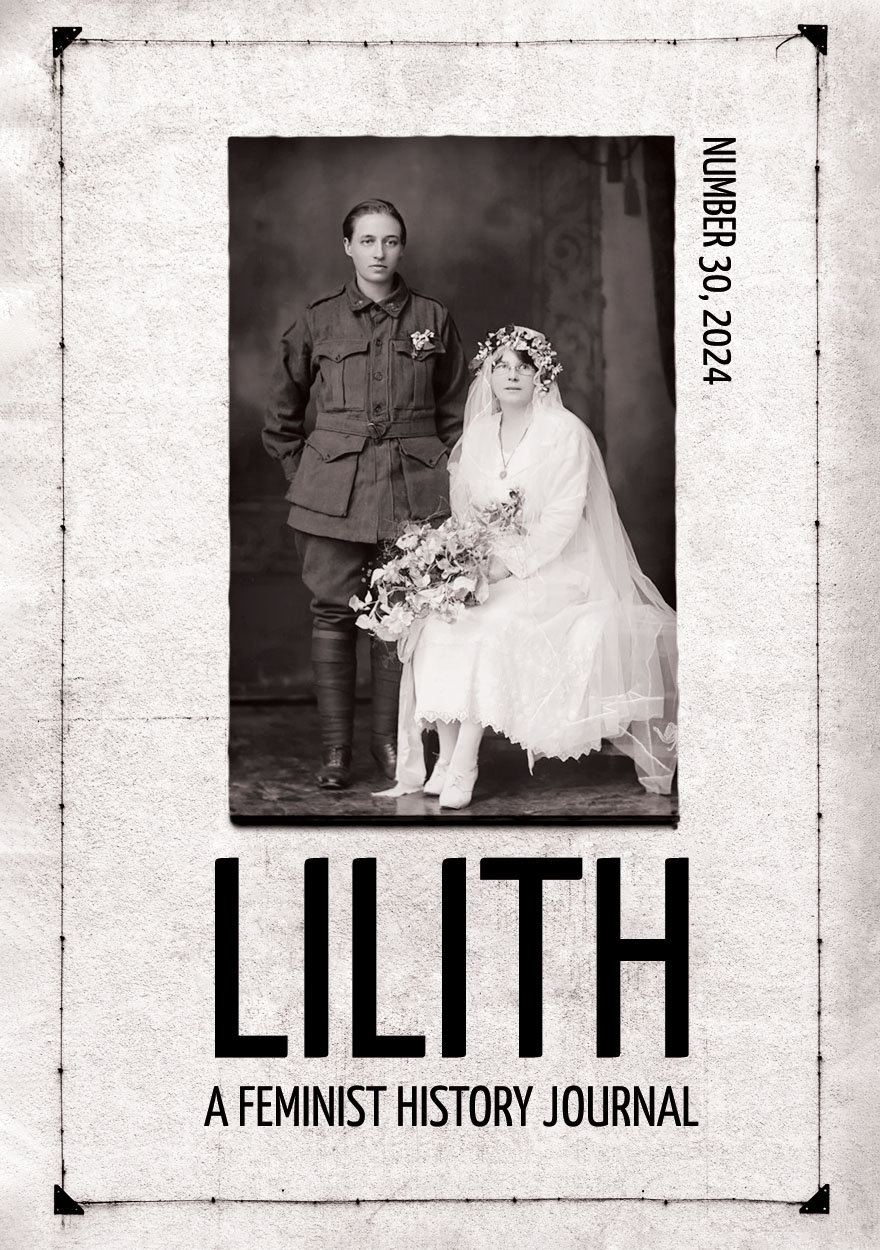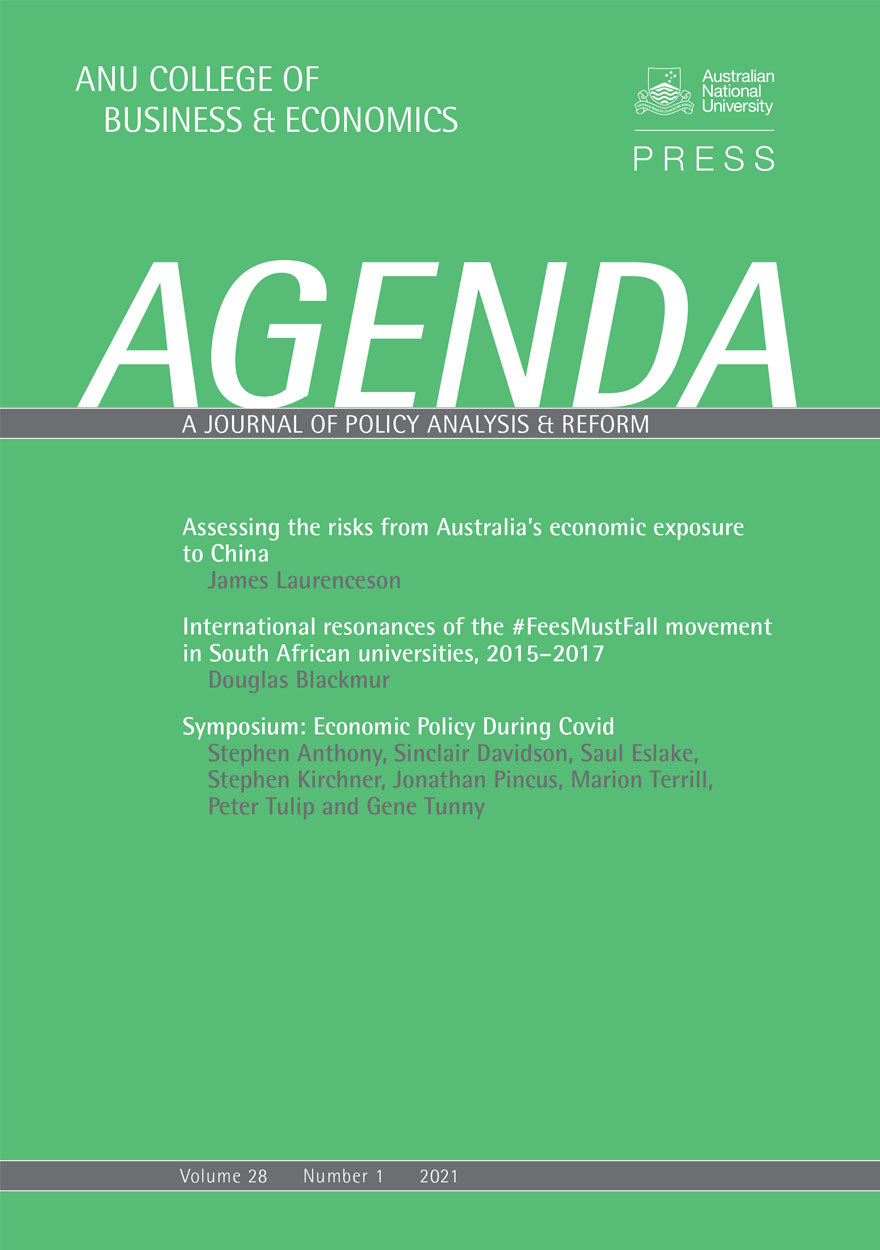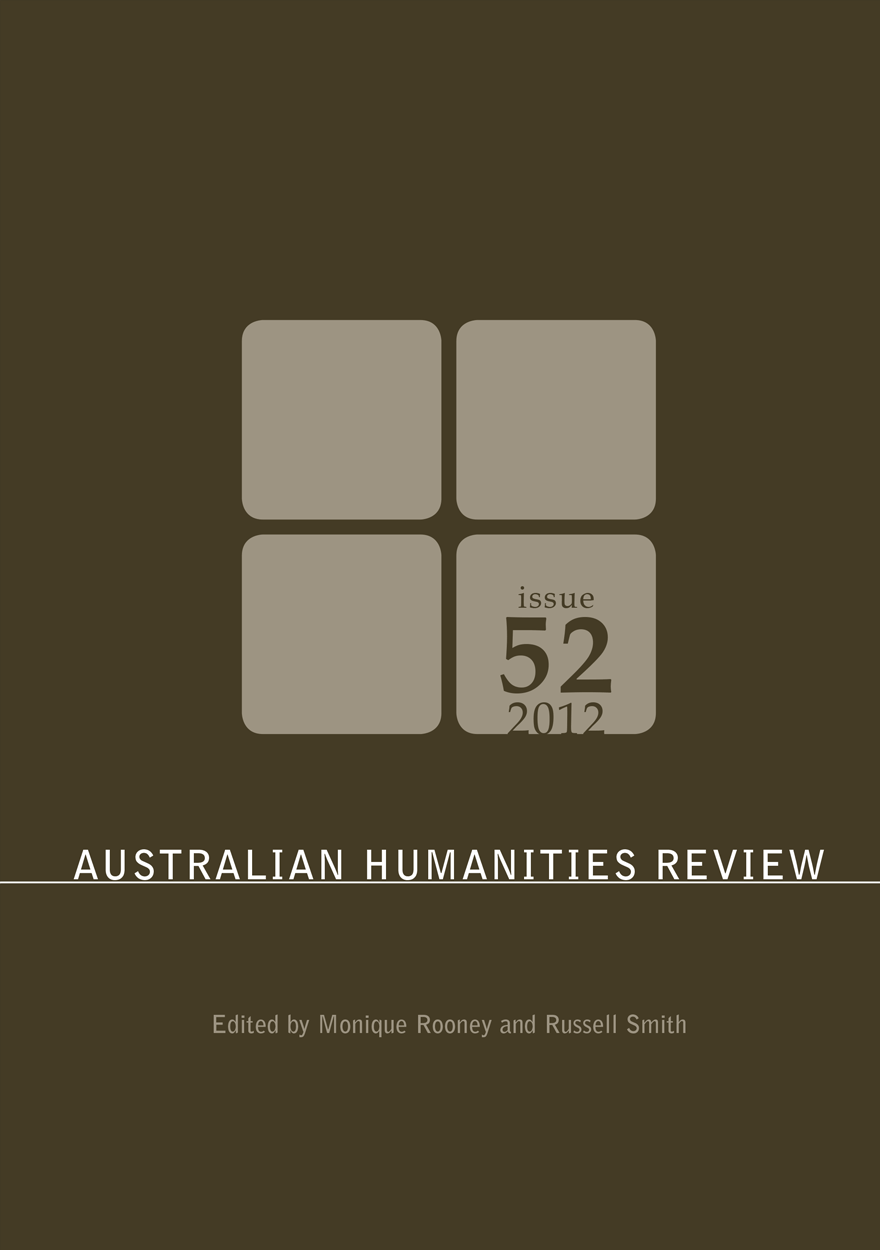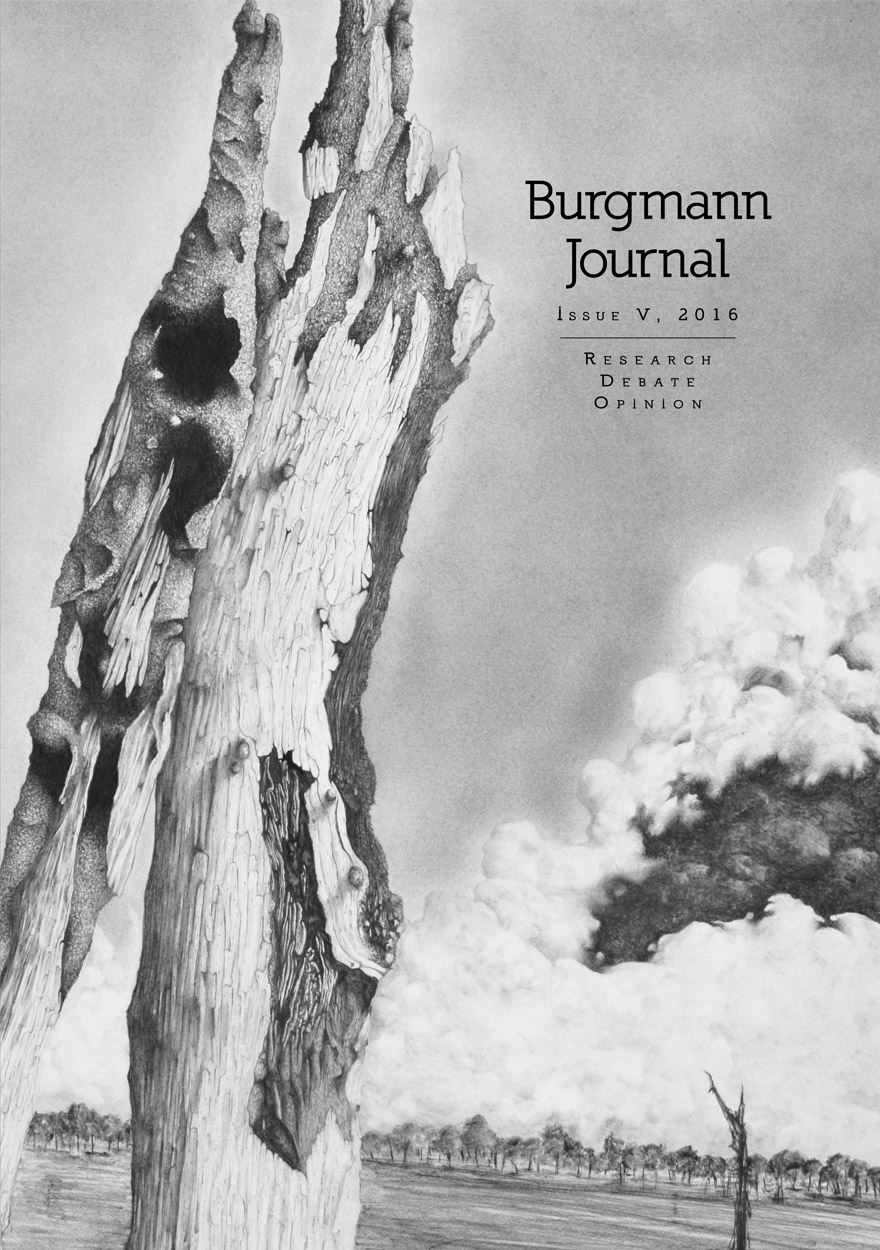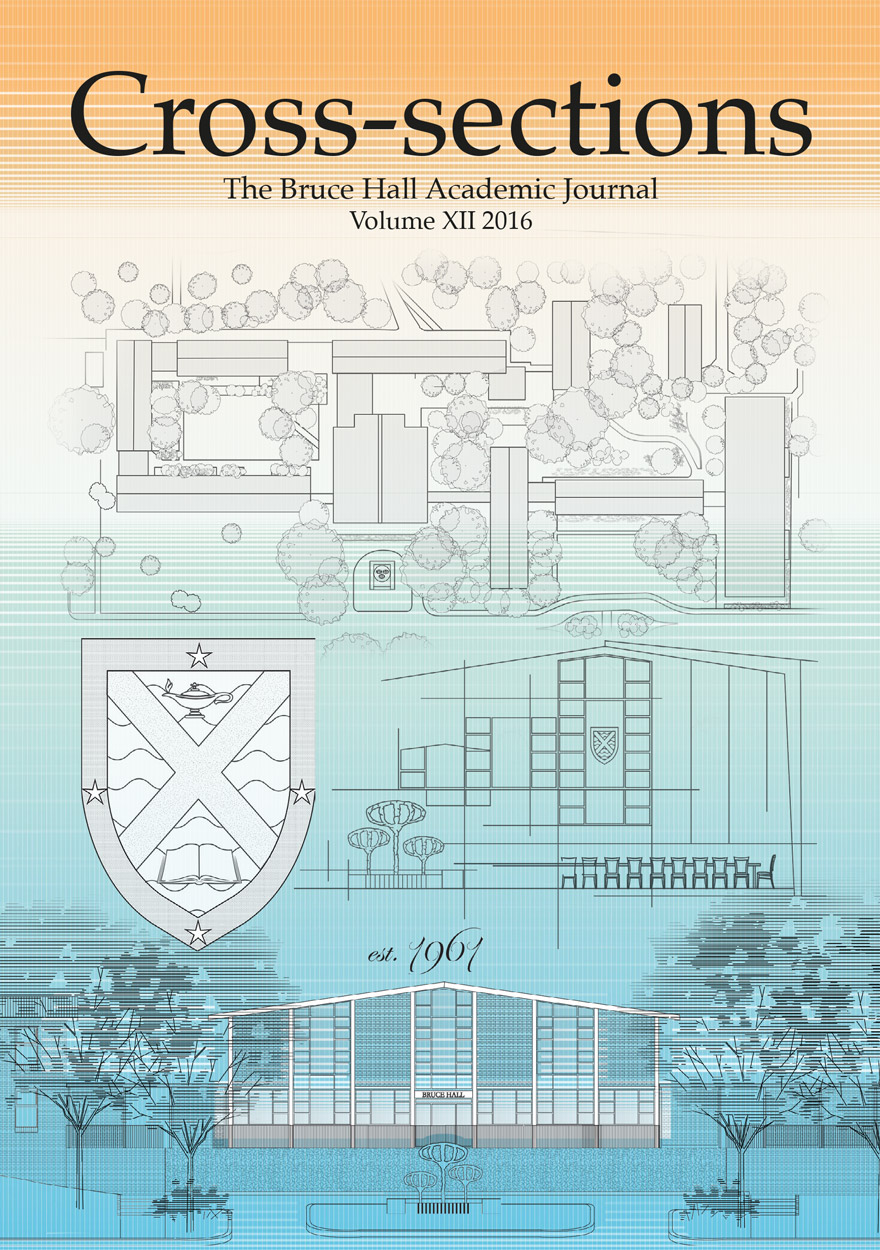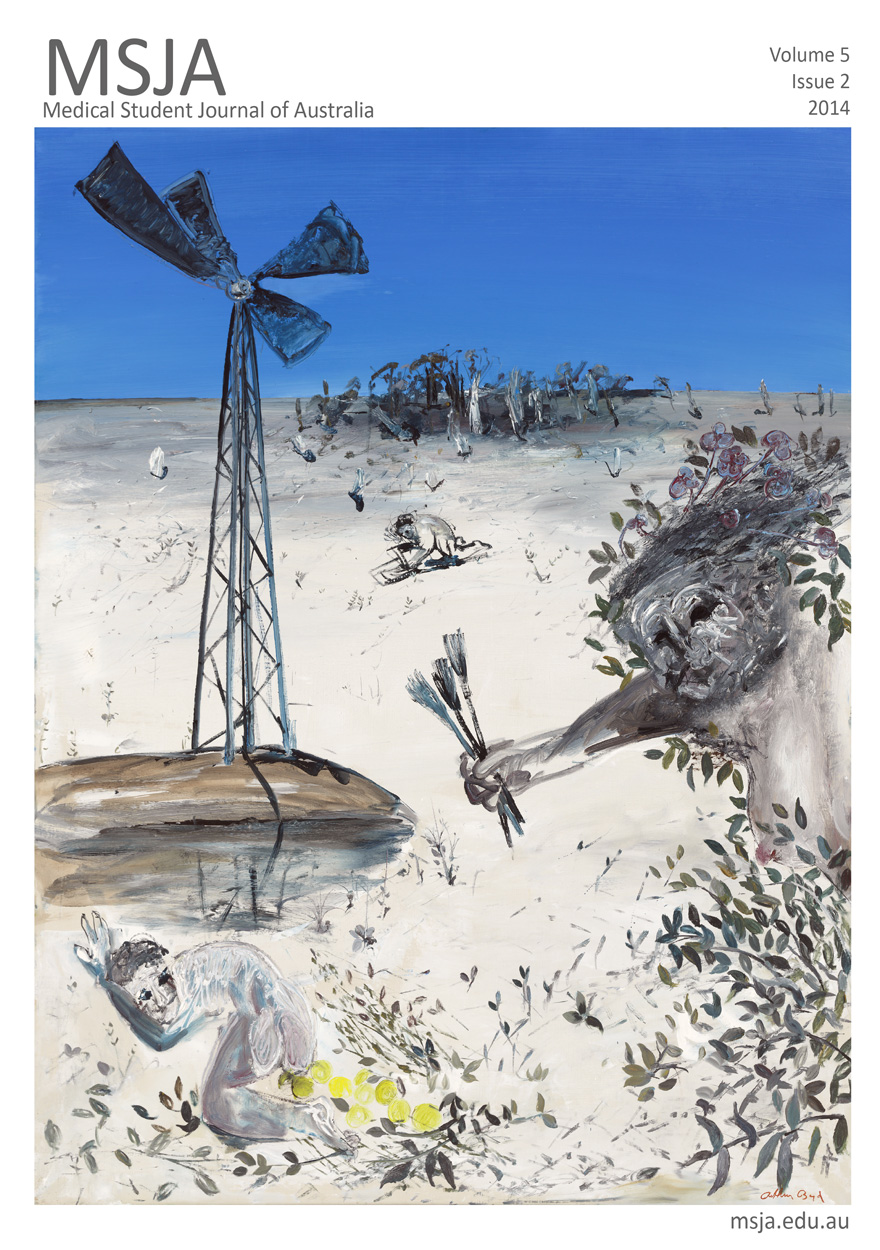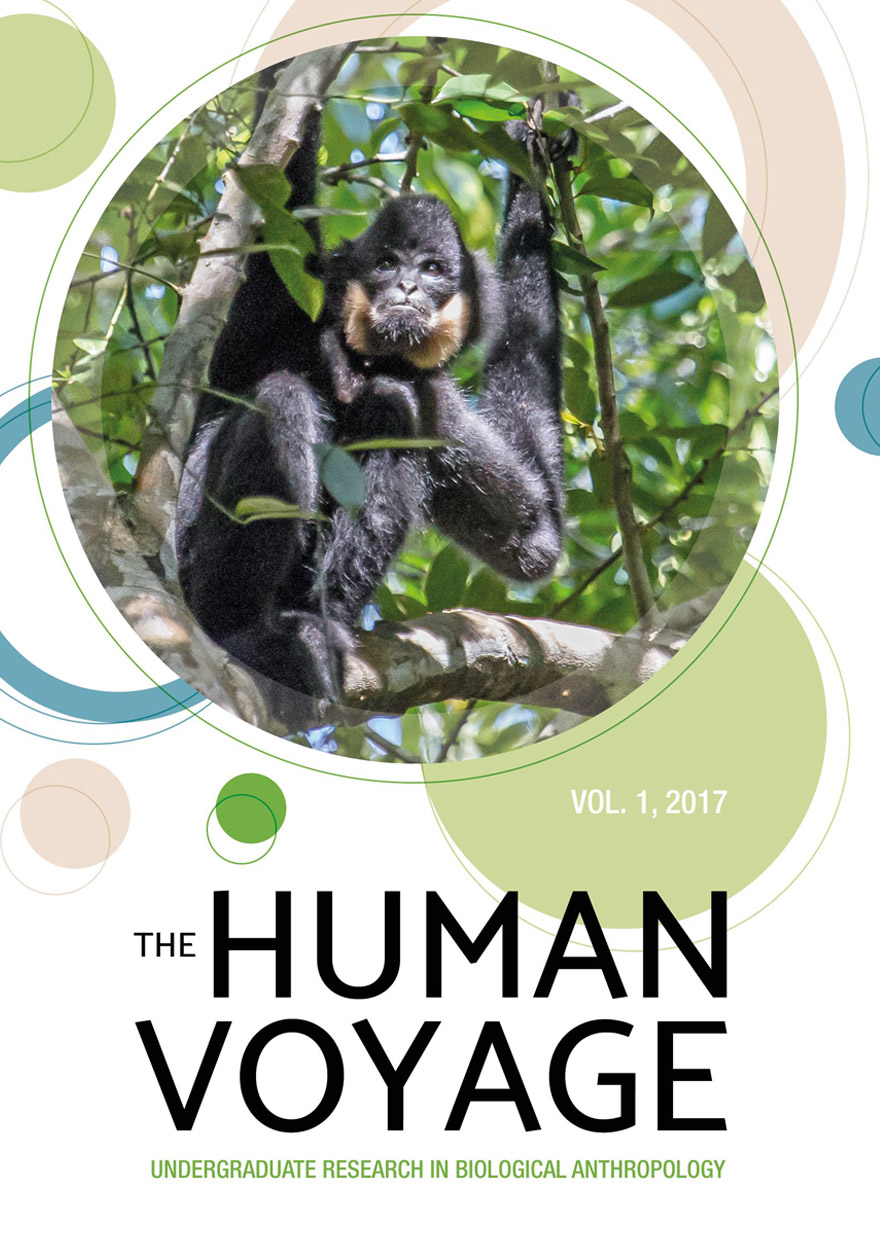Journals
Browse or search a variety of academic journals maintained by ANU Press, or find out more about the journal authors. Download the book for free or buy a print-on-demand copy.

Negotiating the Sacred II »
Blasphemy and Sacrilege in the Arts
Edited by: Elizabeth Burns Coleman, Maria Suzette Fernandes-Dias
Publication date: December 2008
Blasphemy and other forms of blatant disrespect to religious beliefs have the capacity to create significant civil and even international unrest. Consequently, the sacrosanctity of religious dogmas and beliefs, stringent laws of repression and codes of moral and ethical propriety have compelled artists to live and create with occupational hazards like uncertain audience response, self-censorship and accusations of deliberate misinterpretation of cultural production looming over their heads. Yet, in recent years, issues surrounding the rights of minority cultures to recognition and respect have raised new questions about the contemporariness of the construct of blasphemy and sacrilege. Controversies over the aesthetic representation of the sacred, the exhibition of the sacred as art, and the public display of sacrilegious or blasphemous works have given rise to heated debates and have invited us to reflect on binaries like artistic and religious sensibilities, tolerance and philistinism, the sacred and the profane, deification and vilification.
Endeavouring to move beyond ‘simplistic’ points about the rights to freedom of expression and sacrosanctity, this collection explores how differences between conceptions of the sacred can be negotiated. It recognises that blasphemy may be justified as a form of political criticism, as well as a sincere expression of spirituality. But it also recognises that within a pluralistic society, blasphemy in the arts can do an enormous amount of harm, as it may also impair relations within and between societies.
This collection evolved out a two-day conference called ‘Negotiating the Sacred: Blasphemy and Sacrilege in the Arts’ held at the Centre for Cross Cultural Research at The Australian National University in November 2005. This is the second volume in a series of five conferences and edited collections on the theme ‘Negotiating the Sacred’. The first conference, ‘Negotiating the Sacred: Blasphemy and Sacrilege in a Multicultural Society’ was held at The Australian National University’s Centre for Cross-Cultural Research in 2004, and published as an edited collection by ANU Press in 2006. Other conferences in the series have included Religion, Medicine and the Body (ANU, 2006), Tolerance, Education and the Curriculum (ANU, 2007), and Governing the Family (Monash University, 2008). Together, the series represents a major contribution to ongoing debates on the political demands arising from religious pluralism in multicultural societies.
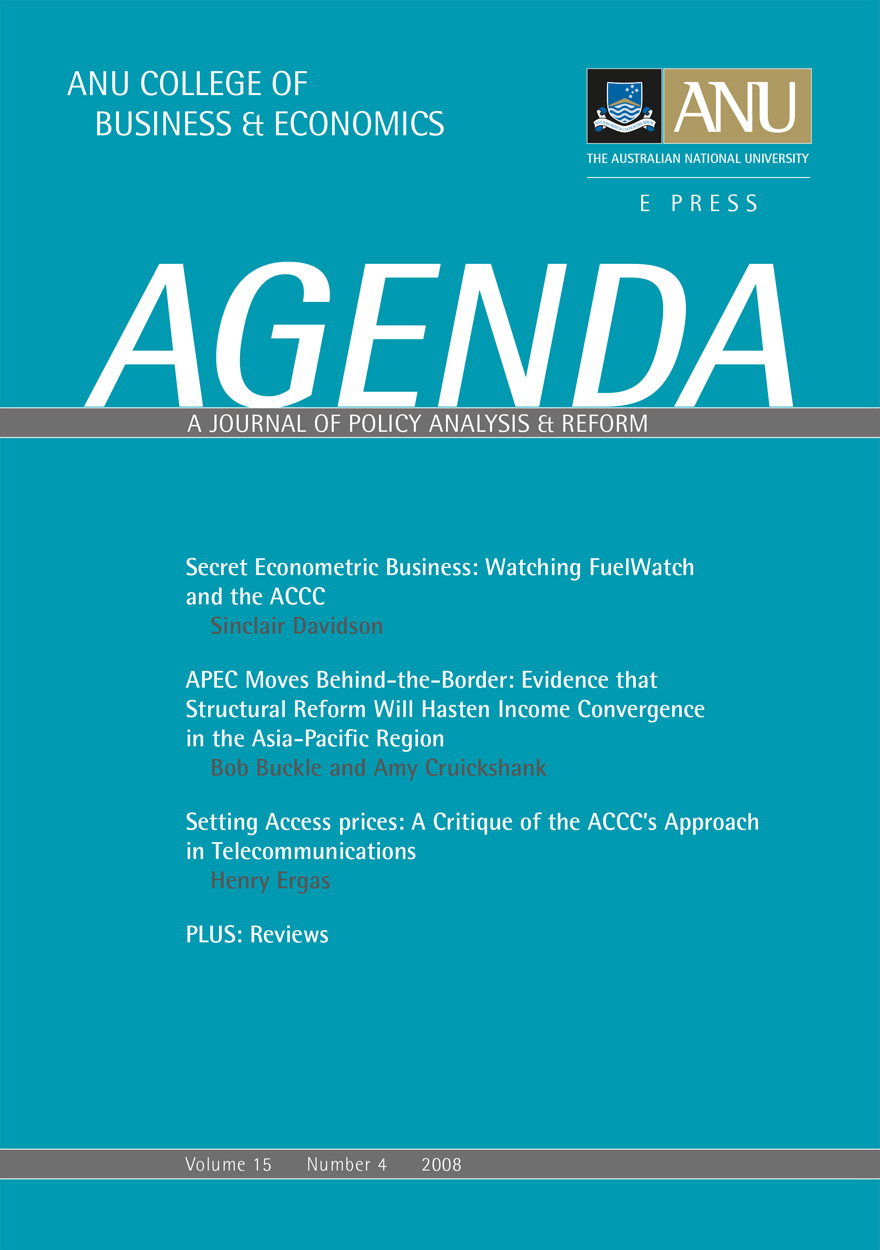
Agenda - A Journal of Policy Analysis and Reform: Volume 15, Number 4, 2008 »
Authored by: William Coleman, Alex Robson
Publication date: December 2008
Agenda is a refereed, ECONLIT-indexed and RePEc-listed journal of the College of Business and Economics, The Australian National University. Launched in 1994, Agenda provides a forum for debate on public policy, mainly (but not exclusively) in Australia and New Zealand. It deals largely with economic issues but gives space to social and legal policy and also to the moral and philosophical foundations and implications of policy.
Subscribe to the Agenda Alerting service if you wish to be advised on forthcoming or new issues.
Download for free
Not available for purchase
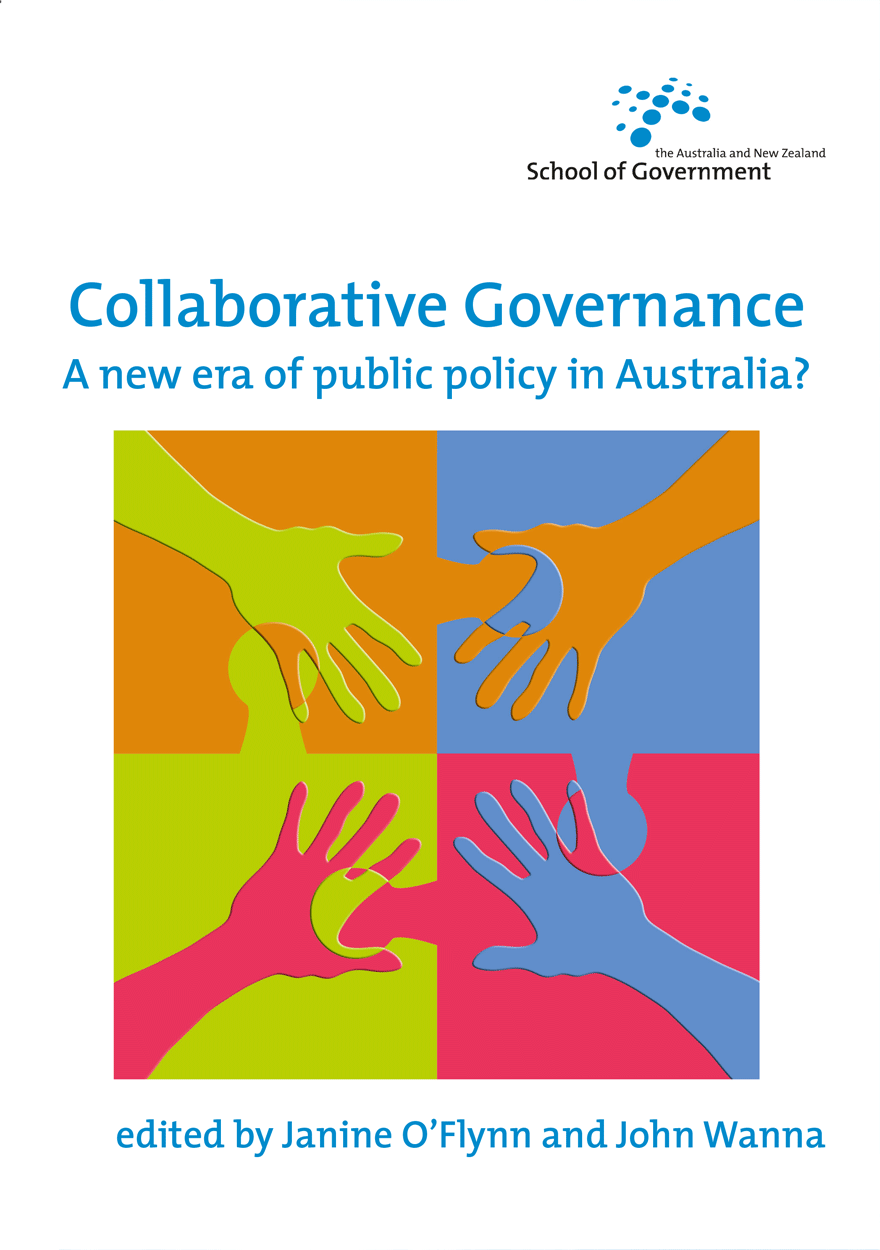
Collaborative Governance »
A new era of public policy in Australia?
Edited by: Janine O'Flynn, John Wanna
Publication date: December 2008
Collaboration has emerged as a central concept in public policy circles in Australia and a panacea to the complex challenges facing Australia. But is this really the cure-all it seems to be? In this edited collection we present scholarly and practitioner perspectives on the drivers, challenges, prospects and promise of collaboration. The papers, first presented at the 2007 ANZSOG Conference, draw on the extensive experience of the contributors in either trying to enact collaboration, or studying the processes of this phenomenon. Together the collection provides important insights into the potential of collaboration, but also the fiercely stubborn barriers to adopting more collaborative approaches to policy and implementation.
The collection includes chapter from public servants, third sector managers, and both Australian and international academics which together make it a stimulating read for those working with or within government. It adds considerably to the debate about how to address current challenges of public policy and provides a significant resource for those interested in the realities of collaborative governance.
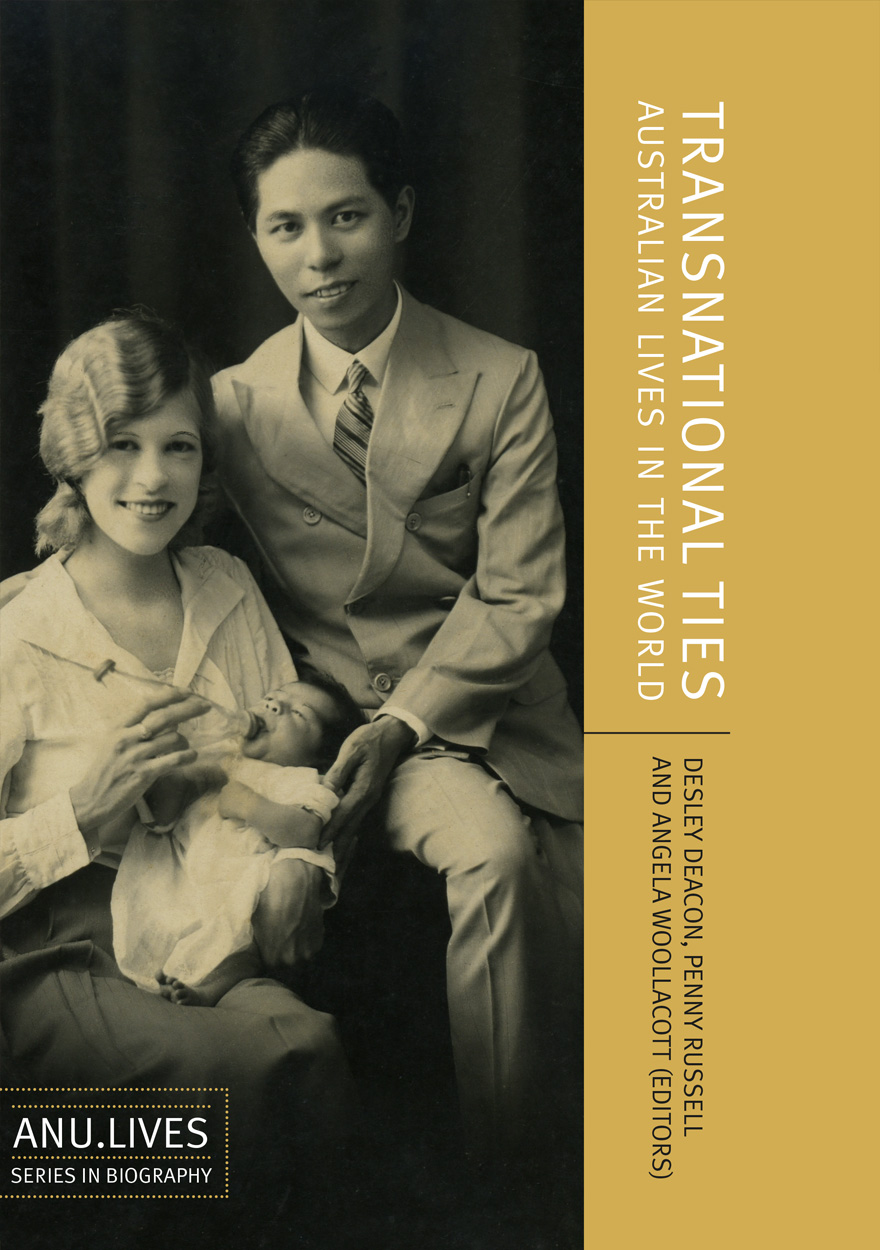
Transnational Ties »
Australian Lives in the World
Edited by: Desley Deacon, Penny Russell, Angela Woollacott
Publication date: December 2008
Australian lives are intricately enmeshed with the world, bound by ties of allegiance and affinity, intellect and imagination. In Transnational Ties: Australian Lives in the World, an eclectic mix of scholars—historians, literary critics, and museologists—trace the flow of people that helped shape Australia’s distinctive character and the flow of ideas that connected Australians to a global community of thought. It shows how biography, and the study of life stories, can contribute greatly to our understanding of such patterns of connection and explores how transnationalism can test biography’s limits as an intellectual, professional and commercial practice.

Islamising Indonesia »
The Rise of Jemaah Tarbiyah and the Prosperous Justice Party (PKS)
Authored by: Yon Machmudi
Publication date: November 2008
The Prosperous Justice Party (PKS) is the most interesting phenomenon in contemporary Indonesian politics. Not only is it growing rapidly in membership and electoral support, it is also bringing a new and markedly different approach to Islamic politics, one which has no precedent in Indonesian history.
Understanding PKS and analysing its political behaviour presents challenges to scholars and observers. This is partly due to the fact that the party represents a new trend within Indonesian Islam which has few parallels with preceding movements.
Yon Machmudi has rendered us a valuable service. In this book, he provides a thoughtful and authoritative context for viewing PKS. He critiques the existing categorisations for Indonesian Islam and points to their inadequacy when describing the PKS and the campus-based Tarbiyah movement from which it sprang. He reworks the santri typology, dividing it into convergent, radical and global substreams. This offers new possibilities for explaining the PKS phenomenon and assists in differentiating between various types of Islamic revivalism in contemporary Indonesia. It also allows a more understanding of the accommodatory stance which PKS has towards the state and other political forces.
Yon’s text provides a good overview of the development of PKS from its Tarbiyah movement origins to its impressive success at the 2004 general elections. It considers the party’s attitude towards the issues of sharia implementation and community welfare and closes by examining the future challenges facing PKS.
It is a well written and authoritative account from a scholar who has done wideranging research on the party.

Public Leadership »
Perspectives and practices
Edited by: Paul `t Hart, John Uhr
Publication date: November 2008
‘Leadership’ is routinely admired, vilified, ridiculed, invoked, trivialised, explained and speculated about in the media and in everyday conversation. Despite all this talk, there is surprisingly little consensus about how to answer basic questions about the nature, place, role and impact of leadership in contemporary society. This book brings together academics from a broad array of social science disciplines who are interested in contemporary understandings of leadership in the public domain. Their work on political, administrative and civil society leadership represents a stock-take of what we need to know and offers original examples of what we do know about public leadership. Although this volume connects scholars living in, and mostly working on, public leadership in Australia and New Zealand, their contributions have a much broader scope and relevance.

Remaining Karen »
A Study of Cultural Reproduction and the Maintenance of Identity
Authored by: Ananda Rajah
Publication date: November 2008
This publication of Remaining Karen is intended as a tribute to Ananda Rajah and his consummate skills as an ethnographer. It is also a tribute to his long-term engagement in the study of the Karen. Remaining Karen was Ananda Rajah’s first focused study of the Sgaw Karen of Palokhi in northern Thailand, which he submitted in 1986 for this PhD in the Department of Anthropology in the Research School of Pacific and Asian Studies at The Australian National University. It is a work of superlative ethnography set in an historical and regional context and as such retains its value to the present.

Australian Humanities Review: Issue 45, 2008 »
Edited by: Monique Rooney, Russell Smith
Publication date: November 2008
Australian Humanities Review is a peer-reviewed interdisciplinary journal featuring articles, essays and reviews focusing on a wide array of topics related to literature, culture, history and politics.
Download for free
Not available for purchase
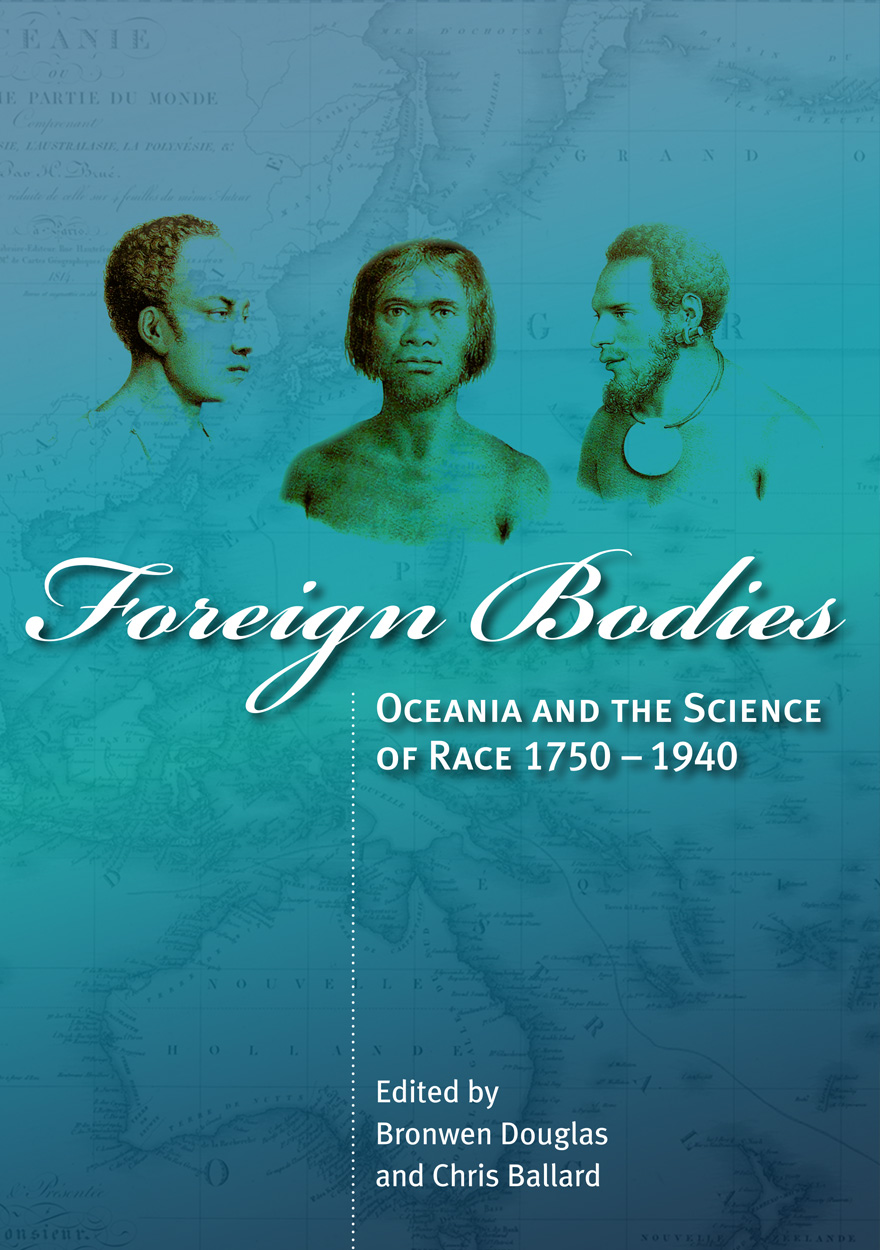
Foreign Bodies »
Oceania and the Science of Race 1750–1940
Edited by: Bronwen Douglas, Chris Ballard
Publication date: October 2008
From the 18th century, Oceania became the principal laboratory of raciology for scholars, voyagers, and colonisers alike. By juxtaposing encounters and theory, this magisterial book explores the semantics of human difference in all its emotional, intellectual, religious, and practical dimensions. The argument developed is subtle, engrossing, and gives the paradigm of ‘race’ its full use value. Foreign Bodies is a model of analysis and erudition from which historians of science and everyone interested in intercultural relations will greatly profit.
— Claude Blanckaert, CNRS (Centre Alexandre Koyré), Paris, and Honorary President, French Society for the History of the Science of Man

Struggling for Self Reliance »
Four case studies of Australian Regional Force Projection in the late 1980s and the 1990s
Authored by: Bob Breen
Publication date: October 2008
Military force projection is the self-reliant capacity to strike from mainland ports, bases and airfields to protect Australia’s sovereignty as well as more distant national interests.
Force projection is not just a flex of military muscle in times of emergency or the act of dispatching forces. It is a cycle of force preparation, command, deployment, protection, employment, sustainment, rotation, redeployment and reconstitution. If the Australian Defence Force consistently gets this cycle wrong, then there is something wrong with Australia’s defence.
This monograph is a force projection audit of four Australian regional force projections in the late 1980s and the 1990s—valid measures of competence. It concludes that Australia is running out of luck and time.
The Rudd Government has commissioned a new Defence White paper. This monograph is Exhibit A for change.
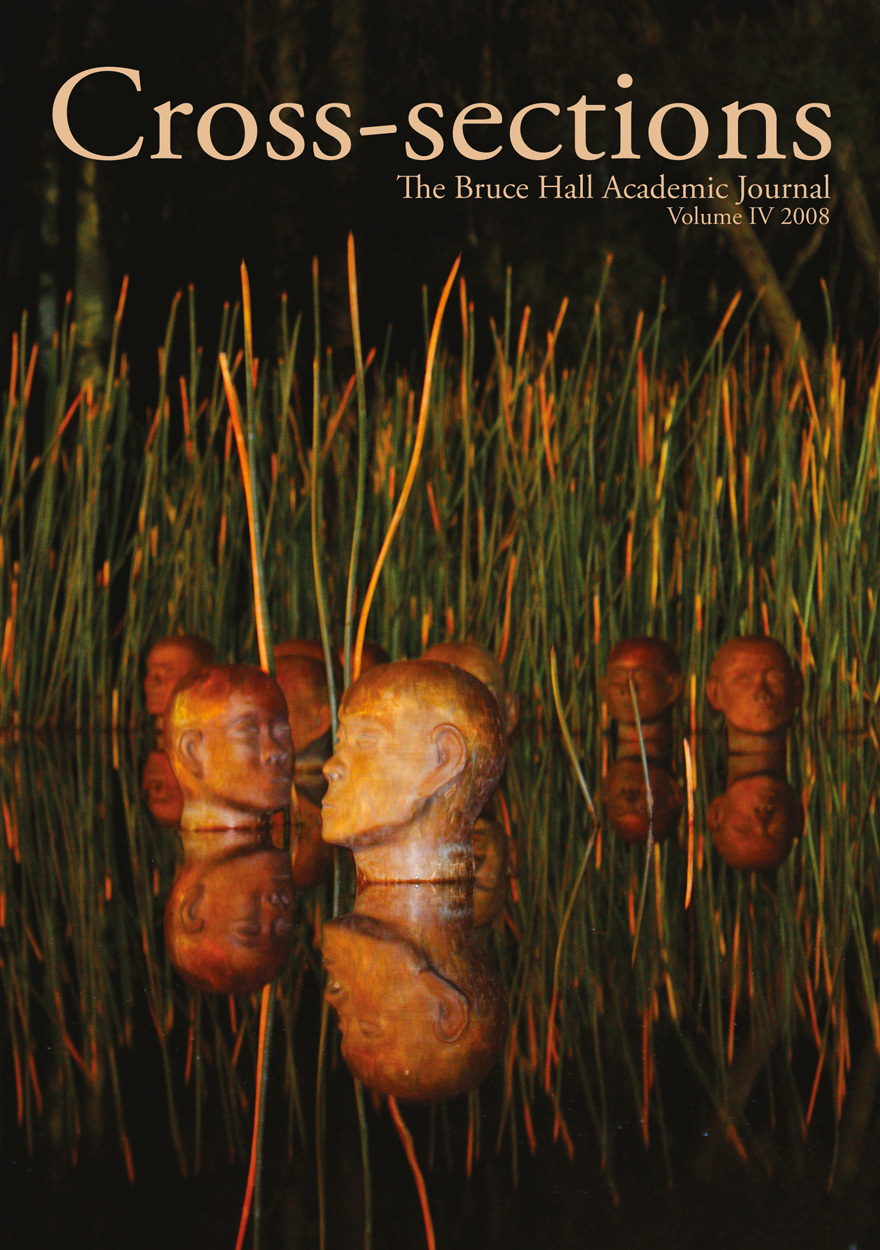
Cross-sections, The Bruce Hall Academic Journal: Volume IV, 2008 »
Publication date: 2008
Representing the combined energies of a large group of authors, editors, artists and researchers associated with Bruce Hall at the ANU, Cross-sections collects a range of works (from academic articles and essays to photography, digital art and installation artwork) that represents the disciplinary breadth and artistic vitality of the ANU.
Presenting a challenging and absorbing way for students to hone vital research skills, in the process, Cross-sections nurtures a fruitful environment of collaborative interaction between academics and students.
Download for free
Not available for purchase

Contested Governance »
Culture, power and institutions in Indigenous Australia
Edited by: Janet Hunt, Diane Smith, Stephanie Garling, Will Sanders
Publication date: October 2008
It is gradually being recognised by both Indigenous and non-Indigenous Australians that getting contemporary Indigenous governance right is fundamental to improving Indigenous well-being and generating sustained socioeconomic development. This collection of papers examines the dilemmas and challenges involved in the Indigenous struggle for the development and recognition of systems of governance that they recognise as both legitimate and effective. The authors highlight the nature of the contestation and negotiation between Australian governments, their agents, and Indigenous groups over the appropriateness of different governance processes, values and practices, and over the application of related policy, institutional and funding frameworks within Indigenous affairs.
The long-term, comparative study reported in this monograph has been national in coverage, and community and regional in focus. It has pulled together a multidisciplinary team to work with partner communities and organisations to investigate Indigenous governance arrangements–the processes, structures, scales, institutions, leadership, powers, capacities, and cultural foundations–across rural, remote and urban settings.
This ethnographic case study research demonstrates that Indigenous and non-Indigenous governance systems are intercultural in respect to issues of power, authority, institutions and relationships. It documents the intended and unintended consequences–beneficial and negative–arising for both Indigenous and non-Indigenous Australians from the realities of contested governance. The findings suggest that the facilitation of effective, legitimate governance should be a policy, funding and institutional imperative for all Australian governments.
This research was conducted under an Australian Research Council Linkage Project, with Reconciliation Australia as Industry Partner.

Calvin for the Third Millennium »
Authored by: Hans Mol
Publication date: September 2008
This work is a series of sermons produced by Emeritus Professor Hans Mol, and based on Biblical texts, the Commentaries of John Calvin on these texts, and on Calvin’s Institutes of the Christian Religion. Mol is Australia’s pre-eminent scholar in the sociology of religion, particularly in Australia. His 1971 volume, Religion in Australia, was the first attempt at statistical analysis of religion in Australia, which was also internationally significant. Parallel to Mol’s interest in the sociology of religion has been his interest in Calvin. Indeed the theological basis of his life has been as a Calvinist. Here in this volume he brings both of these interests together. His sermons, preached over the years in Canberra, seek to apply the teachings of Calvin to a world-view in which the scientific study of religion, and indeed the wider study of sociology, are of central significance. In these sermons, he succeeds considerably in this.
The volume is a substantial contribution to scholarship, in that the combination of these two factors has only rarely been attempted. Thus, the volume has originality and will have enduring value. It is especially appropriate that it should be published at this time, in preparation for the 500th Anniversary of Calvin’s birth (1509–2009).

The Information Systems Academic Discipline in Australia »
Edited by: Guy G. Gable, Shirley Gregor, Roger Clarke, Gail Ridley, Robert Smyth
Publication date: September 2008
This book represents the second phase of a multi-method, multi-study of the ‘Information Systems Academic Discipline in Australia’. Drawing on Whitley’s Theory of Scientific Change, the study analysed the degree of ‘professionalisation’ of the Information Systems Discipline, the overarching research question being ‘To what extent is Information Systems a distinct and mature discipline in Australia?’
The book chapters are structured around three main sections: a) the context of the study; b) the state case studies; and c) Australia-wide evidence and analysis. The book is crafted to be accessible to IS and non-IS types both within and outside of Australia. It represents a ‘check point’; a snapshot at a point in time. As the first in a hoped for series of such snap-shots, it includes a brief history of IS in Australia, bringing us up to the time of this report.
The editorial team comprises Guy Gable, architect and leader; Bob Smyth, project manager; Shirley Gregor, sponsor, host and co-theoretician; Roger Clarke, discipline memory; and Gail Ridley, theoretician. In phase two, the editors undertook to examine each component study, with a view to arriving at an Australia-wide perspective.

Permissive Residents »
West Papuan refugees living in Papua New Guinea
Authored by: Diana Glazebrook
Publication date: September 2008
This book offers another frame through which to view the event of the outrigger landing of 43 West Papuans in Australia in 2006. West Papuans have crossed boundaries to seek asylum since 1962, usually eastward into Papua New Guinea (PNG), and occasionally southward to Australia. Between 1984–86, around 11,000 people crossed into PNG seeking asylum. After the Government of PNG acceded to the United Nations Convention and Protocol Relating to the Status of Refugees, West Papuans were relocated from informal camps on the international border to a single inland location called East Awin. This volume provides an ethnography of that settlement based on the author’s fieldwork carried out in 1998–99.

Whistleblowing in the Australian Public Sector »
Enhancing the theory and practice of internal witness management in public sector organisations
Edited by: A. J. Brown
Publication date: September 2008
Of the many challenges in public sector management, few are as complex as the management of whistleblowing. Because it can lead to the discovery and rectification of wrongdoing, public interest whistleblowing is widely acknowledged as being positive for organisations and for society at large. However, the conflicts and reprisal risks often associated with whistleblowing also support a widespread belief that every whistleblower is destined to suffer, and nothing can be done to protect them from reprisals. Even if they did it once, sensible employees are often seen as unlikely to ever blow the whistle a second time around.
The extensive research in this book reveals a more complex and, fortunately, more positive picture. The product of one of the world’s most comprehensive research projects on whistleblowing, evidence from over 8,000 public servants in over 100 federal, state and local government agencies shows that whistleblowers can and do survive, and that often their role is highly valued. Public sector managers face significant challenges in better managing and protecting whistleblowers. There is great variation between the many public agencies making the effort, and the many agencies where the outcomes — for managers and whistleblowers alike — are still likely to be grim. This book is compulsory reading for all public sector managers who wish to turn this negative trend around, and for anyone interested in public accountability generally.
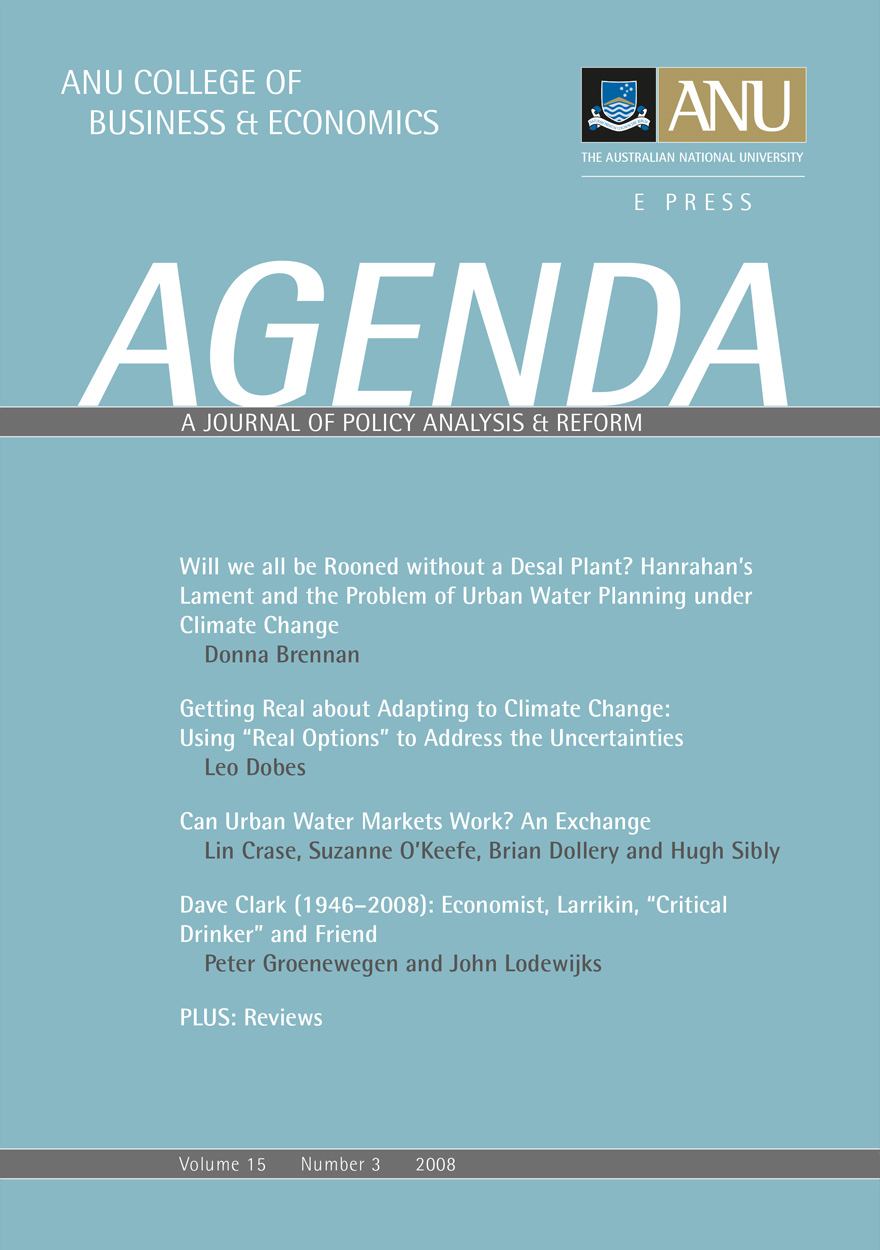
Agenda - A Journal of Policy Analysis and Reform: Volume 15, Number 3, 2008 »
Authored by: William Coleman, Alex Robson
Publication date: September 2008
Agenda is a refereed, ECONLIT-indexed and RePEc-listed journal of the College of Business and Economics, The Australian National University. Launched in 1994, Agenda provides a forum for debate on public policy, mainly (but not exclusively) in Australia and New Zealand. It deals largely with economic issues but gives space to social and legal policy and also to the moral and philosophical foundations and implications of policy.
Subscribe to the Agenda Alerting service if you wish to be advised on forthcoming or new issues.
Download for free
Not available for purchase

Dreamtime Superhighway »
Sydney Basin Rock Art and Prehistoric Information Exchange
Authored by: Jo McDonald
Publication date: August 2008
Dreamtime Superhighway presents a thorough and original contextualization of the rock art and archaeology of the Sydney Basin. By combining excavation results with rock art analysis it demonstrates that a true archaeology of rock art can provide insights into rock art image-making in people’s social and cultural lives. Based on a PhD dissertation, this monograph is a significantly revised and updated study which draws forcefully on rich and new data from extensive recent research—much of it by McDonald herself. McDonald has developed a model that suggests that visual culture—such as rock artmaking and its images and forms—could be understood as a system of communication, as a way of signaling group identifying behaviour. For the archaeologist of art, the anthropologist of art and those of us who try to think about past worlds… this monograph is a must read.
Margaret W. Conkey
University of California, Berkeley

First Contacts in Polynesia »
The Samoan Case (1722–1848) Western Misunderstandings about Sexuality and Divinity
Authored by: Serge Tcherkézoff
Publication date: August 2008
This book explores the first encounters between Samoans and Europeans up to the arrival of the missionaries, using all available sources for the years 1722 to the 1830s, paying special attention to the first encounter on land with the Lapérouse expedition. Many of the sources used are French, and some of difficult accessibility, and thus they have not previously been thoroughly examined by historians. Adding some Polynesian comparisons from beyond Samoa, and reconsidering the so-called ‘Sahlins-Obeyesekere debate’ about the fate of Captain Cook, ‘First Contacts’ in Polynesia advances a hypothesis about the contemporary interpretations made by the Polynesians of the nature of the Europeans, and about the actions that the Polynesians devised for this encounter: wrapping Europeans up in ‘cloth’ and presenting ‘young girls’ for ‘sexual contact’. It also discusses how we can go back two centuries and attempt to reconstitute, even if only partially, the point of view of those who had to discover for themselves these Europeans whom they call ‘Papalagi’. The book also contributes an additional dimension to the much-touted ‘Mead-Freeman debate’ which bears on the rules and values regulating adolescent sexuality in ‘Samoan culture’. Scholars have long considered the pre-missionary times as a period in which freedom in sexuality for adolescents predominated. It appears now that this erroneous view emerged from a deep misinterpretation of Lapérouse’s and Dumont d’Urville’s narratives.

Green Carbon Part 1 »
The role of natural forests in carbon storage
Authored by: Brendan Mackey, Heather Keith, Sandra L. Berry, David B. Lindenmayer
Publication date: August 2008
The colour of carbon matters. Green carbon is the carbon stored in the plants and soil of natural ecosystems and is a vital part of the global carbon cycle. This report is the first in a series that examines the role of natural forests in the storage of carbon, the impacts of human land use activities, and the implications for climate change policy nationally and internationally. REDD (“reducing emissions from deforestation and degradation”) is now part of the agenda for the “Bali Action Plan” being debated in the lead-up to the Copenhagen climate change conference in 2009. Currently, international rules are blind to the colour of carbon so that the green carbon in natural forests is not recognised, resulting in perverse outcomes including ongoing deforestation and forest degradation, and the conversion of extensive areas of land to industrial plantations. This report examines REDD policy from a green carbon scientific perspective. Subsequent reports will focus on issues concerning the carbon sequestration potential of commercially logged natural forests, methods for monitoring REDD, and the long term implications of forest policy and management for the global carbon cycle and climate change.

Remembering Hedley »
Edited by: Coral Bell, Meredith Thatcher
Publication date: August 2008
Remembering Hedley commemorates the life of Hedley Bull (1932–85), a pivotal figure in the fields of international relations and strategic studies. Its publication coincides with the official opening on 6 August 2008 of the Hedley Bull Centre at The Australian National University in Canberra.

Steady Hands Needed »
Reflections on the role of the Secretary of Foreign Affairs and Trade in Australia 1979-1999
Edited by: Trevor Wilson, Graham Cooke
Publication date: August 2008
In this monograph, five former secretaries of the Department of Foreign Affairs and Trade (DFAT) reflect on their experiences and the challenges of their times. A far cry from the pukka fantasies of ‘Yes Minister’, their recollections reveal the realpolitik of the policy front line where the secretary must stay ahead of emerging themes and issues in Australia’s international relations while simultaneously exercising governance oversight and providing leadership to a large, professional, diverse and dispersed organisation. From the Cold War to the War on Terror; from the floating of the dollar to GATT and the WTO; managing relations big and small, within our region and without; through relentless administrative reforms, technological change and changes of government; steering DFAT requires ‘steady hands’. This collection of public lectures presented in 2006 to the Australian Institute of International Affairs (AIIA) offers an invaluable resource for those with an interest in recent Australian history, foreign policy and public sector administration.

The Workshop for Morality »
The Islamic Creativity of Pesantren Daarut Tauhid in Bandung, Java
Authored by: Dindin Solahudin
Publication date: August 2008
This volume is a remarkable study of a most unusual pesantren. Officially known as Pesantren Daarut Tauhid, this pesantren was located in Bandung and flourished at the beginning of a period of Islamic resurgence in Indonesia. More commonly referred to as the Bengkel Akhlaq, this ‘Workshop for Morality’ exerted a special appeal to groups of young urban Muslims, particularly students. Its founder was H. K. Abdullah Gymnastiar, popularly known as Aa Gym, who later went on to become one of Indonesia’s most important Muslim preachers and television celebrities.
The Workshop for Morality is a superb work of both historical and ethnographic relevance that reflects the capacity of its author, Dindin Solahudin, to capture a critical moment in the development of Islam in contemporary Indonesian society.

Our Unswerving Loyalty »
A documentary survey of relations between the Communist Party of Australia and Moscow, 1920–1940
Edited by: David W. Lovell, Kevin Windle
Publication date: August 2008
The story of the Communist Party of Australia has been told in various ways. Until now, however, archival collections that have borne on this story have been relatively inaccessible to the ordinary, interested reader. This book begins to redress that deficiency by bringing together 85 key documents from the Russian State Archives of Social and Political History (RGASPI), selected from a collection of thousands of documents concerning the relations between the Communist International and the Communist Party of Australia. The selection focuses on the relationship between the CPA and the Comintern because the activities of the CPA are essentially incomprehensible without understanding the international communist context within which the CPA operated. That context was dominated by the newly-created Soviet state and its decision to authorize and utilize a network of communist parties throughout the world.
The documents in this work suggest three major propositions about the relationship between the CPA and the Comintern. First, that the Comintern was crucial in the formation of the CPA, via its emissaries, instructions and authority. Second, that the Comintern played a major role in directing the policies of the CPA in domestic matters (not to mention in international matters, where the Comintern’s decisions were supreme). And third, that the leadership of the CPA was, from 1929 onwards, shaped, trained and authorized by the Comintern. With access to the documents, readers now have a chance not just to hear the voices of the times, but to make their own judgements about the relationship between the CPA and Moscow.
The book also includes two extended introductory essays that outline the development of the Comintern and its relations with the CPA, as well as supporting materials that provide information on individuals, organizations and tactics mentioned within the documents themselves.

Australia and Cyber-warfare »
Authored by: Gary Waters, Desmond Ball, Ian Dudgeon
Publication date: July 2008
This book explores Australia’s prospective cyber-warfare requirements and challenges. It describes the current state of planning and thinking within the Australian Defence Force with respect to Network Centric Warfare, and discusses the vulnerabilities that accompany the use by Defence of the National Information Infrastructure (NII), as well as Defence’s responsibility for the protection of the NII. It notes the multitude of agencies concerned in various ways with information security, and argues that mechanisms are required to enhance coordination between them. It also argues that Australia has been laggard with respect to the development of offensive cyber-warfare plans and capabilities. Finally, it proposes the establishment of an Australian Cyber-warfare Centre responsible for the planning and conduct of both the defensive and offensive dimensions of cyber-warfare, for developing doctrine and operational concepts, and for identifying new capability requirements. It argues that the matter is urgent in order to ensure that Australia will have the necessary capabilities for conducting technically and strategically sophisticated cyber-warfare activities by the 2020s.
The Foreword has been contributed by Professor Kim C. Beazley, former Minister for Defence (1984–90), who describes it as ‘a timely book which transcends old debates on priorities for the defence of Australia or forward commitments, [and] debates about globalism and regionalism’, and as ‘an invaluable compendium’ to the current process of refining the strategic guidance for Australia’s future defence policies and capabilities.
ANU Press Journals
Aboriginal History Journal »
Since 1977, the journal Aboriginal History has pioneered interdisciplinary historical studies of Australian Aboriginal people’s and Torres Strait Islander’s interactions with non-Indigenous peoples. It has promoted publication of Indigenous oral traditions, biographies, languages, archival and bibliographic guides, previously unpublished manuscript accounts, critiques of current events, and research and reviews in the fields of anthropology, archaeology, sociology, linguistics, demography, law, geography and cultural, political and economic history.
Aboriginal History Inc. is a publishing organisation based in the Australian Centre for Indigenous History, Research School of Social Sciences, The Australian National University, Canberra.
For more information on Aboriginal History Inc. please visit aboriginalhistory.org.au.
Submission details
Please send article submissions to aboriginal.history@anu.edu.au.
Articles of about 7,000 words in length (including footnotes and references) are preferred, but submissions up to 9,000 words will be considered. Please submit an electronic version of the paper (text only without embedded images or scans) in Microsoft Word or RTF format, along with a short abstract and author biography as a separate document.
ANU Historical Journal II »
The ANU Historical Journal II (ANUHJ II) is an open-access, peer-reviewed academic history journal of the ANU College of Arts and Social Sciences and the ANU College of Asia and the Pacific. It is a revival of the ANU Historical Journal, which was published between 1964 and 1987. Contributors to the first journal included academics such as Ken Inglis, Manning Clark, John Ritchie and Oliver MacDonagh along with then-emerging scholars Iain McCalman, Michael McKernan, Margaret George, Coral Bell, John Iremonger, Alastair Davidson, Susan Magarey and Rosemary Auchmuty. As well as upholding the Journal’s commitment to the work of students and early career researchers, the ANUHJ II has expanded its focus to include memoirs, short articles and long-form book reviews.
The ANUHJ II invites submissions from students, graduates and academics of any Australian university.
For more information about the ANUHJ II, please visit anuhj.com.au
Australian Journal of Biography and History »
The Australian Journal of Biography and History is an initiative of the National Centre of Biography (NCB) in the Research School of Social Sciences at The Australian National University. The NCB was established in 2008 to extend the work of the Australian Dictionary of Biography and to serve as a focus for the study of life writing in Australia, supporting innovative research and writing to the highest standards in the field, nationally and internationally. The Australian Journal of Biography and History seeks to promote the study of biography in Australia. Articles that appear in the journal are lively, engaging and provocative, and are intended to appeal to the current popular and scholarly interest in biography, memoir and autobiography. They recount interesting and telling life stories and engage critically with issues and problems in historiography and life writing.
The journal publishes peer-reviewed articles on Australian historical biography, including biographical studies, studies relating to theory and methodology, and the associated genres of autobiography, life writing, memoir, collective biography and prosopography. We are especially interested in articles that explore the way in which biography and its associated genres can illuminate themes in Australian history, including women in Australian society, family history, transnational networks and mobilities, and Indigenous history.
Submission Details
Please send article submissions or abstracts to the Editor, Dr Malcolm Allbrook, National Centre of Biography, The Australian National University. Email: Malcolm.Allbrook@anu.edu.au. Articles should be in the range of 5,000 to 8,000 words (excluding footnotes), although longer submissions may be considered after consultation with the Editor. Style and referencing: please use footnotes in Chicago style, and follow British spelling.
East Asia Forum Quarterly »
East Asia Forum Quarterly grew out of East Asia Forum (EAF) online, which has developed a reputation for providing a platform for the best in Asian analysis, research and policy comment on the Asia Pacific region in world affairs. EAFQ aims to provide a further window onto research in the leading research institutes in Asia and to provide expert comment on current developments within the region. The East Asia Forum Quarterly, like East Asia Forum online, is an initiative of the East Asia Forum (EAF) and its host organisation, the East Asian Bureau of Economic Research (EABER) in the Crawford School of Public Policy in the ANU College of Asia & the Pacific at The Australian National University.
Submission details
Unsolicited submissions to EAF are welcome. An analytic op-ed piece that is accessible to a general audience and written in crisp language is required. The preferred length of submissions is around 800 words. Submissions will be double-blind reviewed and, if accepted for publication, edited for English fluency and house style before returned for clearance by the author. EAFQ does not use footnotes but would be extremely appreciative if hyperlinks to internet sources are included wherever possible. EAFQ reserves the right to determine the title for any piece, but will not publish a piece or a title without permission. A suggested title is appreciated. If you have any further queries, or would like to submit, please contact shiro.armstrong@anu.edu.au.
Human Ecology Review »
Human Ecology Review is a semi-annual journal that publishes peer-reviewed interdisciplinary research on all aspects of human–environment interactions (Research in Human Ecology). The journal also publishes essays, discussion papers, dialogue, and commentary on special topics relevant to human ecology (Human Ecology Forum), book reviews (Contemporary Human Ecology), and letters, announcements, and other items of interest (Human Ecology Bulletin). Human Ecology Review also publishes an occasional paper series in the Philosophy of Human Ecology and Social–Environmental Sustainability.
Submission details
For information on preparing your manuscript for submission, please visit www.humanecologyreview.org. To submit a manuscript to Human Ecology Review, please visit mstracker.com/submit1.php?jc=her, or email humanecologyreviewjournal@gmail.com.
Humanities Research »
Humanities Research is a peer-reviewed, open access, annual journal that promotes outstanding innovative, interdisciplinary and multidisciplinary scholarship to advance critical knowledge about the human world and society.
The journal is co-published by the Humanities Research Centre, The Australian National University, Canberra. It was launched in 1997 and went into hiatus in 2013. In 2022, the journal is resuming publication, reflecting the continuing strength of the humanities at The Australian National University, the rapid development of the interdisciplinary, environmental and public humanities over the last decade, and the opportunities for international collaboration reflected in the resumption of international travel in 2022.
Issues are thematic with guest editors and address important and timely topics across all branches of the humanities.
International Review of Environmental History »
International Review of Environmental History takes an interdisciplinary and global approach to environmental history. It encourages scholars to think big and to tackle the challenges of writing environmental histories across different methodologies, nations, and time-scales. The journal embraces interdisciplinary, comparative and transnational methods, while still recognising the importance of locality in understanding these global processes.
The journal’s goal is to be read across disciplines, not just within history. It publishes on all thematic and geographic topics of environmental history, but especially encourage articles with perspectives focused on or developed from the southern hemisphere and the ‘global south’.
Submission details
Please send article submissions or abstracts to the Editor, Associate Professor James Beattie, Science in Society, Victoria University of Wellington, PO Box 600, Wellington 6142, New Zealand. Email: james.beattie@vuw.ac.nz.
Abstracts should be no more than 200 words, and include a list of keywords. Articles should be in the range 5,000 to 8,000 words (including footnotes), although longer submissions may be considered after consultation with the editor. Style and referencing: please use footnotes in Chicago Style, follow British spelling, and use single quotation marks only. Find out more details about Chicago Style.
Lilith: A Feminist History Journal »
Lilith: A Feminist History Journal is an annual journal that publishes articles, essays and reviews in all areas of feminist and gender history (not limited to any particular region or time period). In addition to publishing research articles on diverse aspects of gender history, Lilith is also interested in publishing feminist historiographical and methodological essays (which may be shorter in length than typical research articles). Submissions from Australian and international early career researchers and postgraduate students are particularly encouraged.
The journal first began publication in Melbourne in 1984. It is the official journal of the Australian Women’s History Network, an organisation dedicated to promoting research and writing in all fields of women’s, feminist and gender history.
For more information about Lilith, please visit www.auswhn.org.au/lilith/.
Made in China Journal »
The Made in China Journal (MIC) is a publication focusing on labour, civil society and human rights in China. It is founded on the belief that spreading awareness of the complexities and nuances underpinning socioeconomic change in contemporary Chinese society is important, especially considering how in today’s globalised world Chinese labour issues have reverberations that go well beyond national borders. MIC rests on two pillars: the conviction that today, more than ever, it is necessary to bridge the gap between the scholarly community and the general public, and the related belief that open-access publishing is necessary to ethically reappropriate academic research from commercial publishers who restrict the free circulation of ideas.
Discontinued ANU Press Journals
Agenda - A Journal of Policy Analysis and Reform »
Please note: This journal ceased publishing in 2021.
Agenda is a refereed, ECONLIT-indexed and RePEc-listed journal of the College of Business and Economics, The Australian National University. Launched in 1994, Agenda provides a forum for debate on public policy, mainly (but not exclusively) in Australia and New Zealand. It deals largely with economic issues but gives space to social and legal policy and also to the moral and philosophical foundations and implications of policy.
Submission details
Authors are invited to submit articles, notes or book reviews, but are encouraged to discuss their ideas with the Editor beforehand. All manuscripts are subject to a refereeing process. Manuscripts and editorial correspondence should be emailed to: william.coleman@anu.edu.au.
Subscribe to the Agenda Alerting service if you wish to be advised on forthcoming or new issues.
Australian Humanities Review »
Please note: This journal ceased publishing with ANU Press in 2012. Current issues are available at australianhumanitiesreview.org.
Australian Humanities Review is a peer-reviewed interdisciplinary journal featuring articles, essays and reviews focusing on a wide array of topics related to literature, culture, history and politics.
craft + design enquiry »
Please note: This journal ceased publishing in 2015.
craft + design enquiry is an open-access, peer-reviewed journal promoting and disseminating research excellence generated by and about the craft and design sector. craft + design enquiry investigates the contribution that contemporary craft and design makes to society, establishing a dialogue between craft and design practice and cultural, social and environmental concerns. It includes submissions from across the field of craft and design from artists and practitioners, curators, historians, art and cultural theorists, educationalists, museum professionals, philosophers, scientists and others with a stake in the future developments of craft and design.
ANU Student Journals
ANU Undergraduate Research Journal »
Please note: This journal is now published via the ANU Student Journals platform; the latest issues can be found here: studentjournals.anu.edu.au/index.php/aurj
The ANU Undergraduate Research Journal presents outstanding essays taken from ANU undergraduate essay submissions. The breadth and depth of the articles chosen for publication by the editorial team and reviewed by leading ANU academics demonstrates the quality and research potential of the undergraduate talent being nurtured at ANU across a diverse range of fields.
Established in 2008, AURJ was designed to give students a unique opportunity to publish their undergraduate work; it is a peer-reviewed journal managed by a team of postgraduate student editors, with guidance from the staff of the Office of the Dean of Students.
Burgmann Journal - Research Debate Opinion »
Please note: This journal is now published via the ANU Student Journals platform; the latest issues can be found here: studentjournals.anu.edu.au/index.php/burgmann
Burgmann Journal is an interdisciplinary, peer-reviewed publication of collected works of research, debate and opinion from residents and alumni of Burgmann College designed to engage and stimulate the wider community.
Cross-sections, The Bruce Hall Academic Journal »
Please note: This journal is now published via the ANU Student Journals platform; the latest issues can be found here: studentjournals.anu.edu.au/index.php/cs
Representing the combined energies of a large group of authors, editors, artists and researchers associated with Bruce Hall at the ANU, Cross-sections collects a range of works (from academic articles and essays to photography, digital art and installation artwork) that represents the disciplinary breadth and artistic vitality of the ANU.
Presenting a challenging and absorbing way for students to hone vital research skills, in the process, Cross-sections nurtures a fruitful environment of collaborative interaction between academics and students.
Medical Student Journal of Australia »
Please note: This journal ceased publishing in 2015.
The Medical Student Journal of Australia provides the medical school of The Australian National University with a platform for medical students to publish their work in a peer-reviewed journal, communicating the results of medical and health research information clearly, accurately and with appropriate discussion of any limitations or potential bias.
Merici - Ursula Hall Academic Journal »
Please note: This journal is currently not publishing any new issues.
Merici is the combined works of undergraduate authors at Ursula Hall. Merici contains research and analysis from a range of disciplines and is thoroughly reviewed by ANU academics to ensure the showcasing of the best Ursula Hall has to offer.
The Human Voyage: Undergraduate Research in Biological Anthropology »
Please note: This journal is now published via the ANU Student Journals platform; the latest issues can be found here: studentjournals.anu.edu.au/index.php/hv
The Human Voyage: Undergraduate Research in Biological Anthropology is a journal that publishes outstanding student articles in all areas of biological anthropology, including primatology, palaeoanthropology, bioarchaeology and human behavioural ecology.
While the primary goal of this journal is to publish work of the highest quality authored by undergraduate students, it will also educate students in regards to publishing in academia. All submissions will be peer-reviewed and edited by ANU academic staff.




